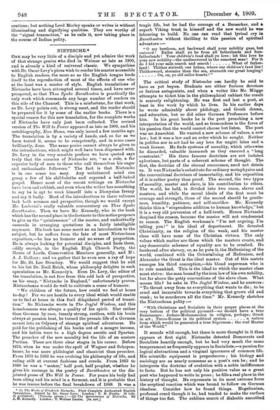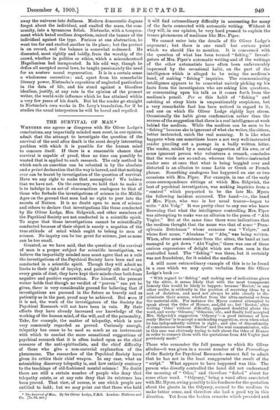NIETZSCHE.*
ONE may be very little of a disciple and yet admire the work of that strange genius who died in Weimar so late as 1900, and is already a kind of universal classic. We sympathise with Dr. Oscar Levy's pious wish to render his master accessible to English readers, the more so as the English tongue lends itself to the reproduction of most of the effects of one who at the least was a master of style. English translations of Nietzsche have been attempted several times, and have never prospered, so that Thus Spake Zarathustra is practically the only work which commands any large number of readers on this side of the Channel. This is a misfortune, for that work, as Dr. Levy points out, is strong meat, and the reader should be prepared for it by some of the - earlier books. There is a special reason for this new translation, for the complete works of Nietzsche have only just been collected. The revised version of The Will to Power appeared as late as 1906, and his autobiography, Ecce Homo, was only issued a few months ago. The translation is by a variety of hands, and, so far as we have tested it, seems to be competently, and in some cases brilliantly, done. The same praise cannot always be given to the introductions, which might well have been dispensed with. Dr. Levy in the very sensible preface we have quoted says truly that the enemies of Nietzsche are, "as a rule, a far superior body of men to those who call themselves his eager and enthusiastic followers." The fact is that Nietzsche is in one sense too easy. Any unbalanced mind can grasp a few of his shibboleths and expound a half-baked gospeL Hence most of the recent writings on Nietzsche have been sad rubbish, and even when the writer has something to say he is apt to work himself into a Dionysian frenzy and say it badly. Most of the introductions to these volumes lack both acumen and perspective, though we would except Mr. Ludovici's really valuable commentary on Thus Spake Zarathustra. 'Then we have Mr. Kennedy, who in the book which has the second place in the footnote to this notice proposes to give us the " quintessence of the master, and undoubtedly succeeds in arranging quotations in a fairly intelligible sequence. His book has some merit as an introduction to the subject, but he suffers from the fate of most Nietzschean expositors,—he has no humour and no sense of proportion. He is always looking for potential disciples, and finds them, oddly enough, in the English High Church Party, the House of Lords, Conservative Members generally, and Mr. A. J. Balfour; and we gather that he even sees a ray of hope for Mr. St. Loe Strachey. We would suggest that he add to his list Dr. Emil Reich, whose philosophy delights in such speculation as Mr. Kennedy's. Even Dr. Levy, the editor of the translation, is not free from this odd lack of perspective, as his essay, " Nietzsche in England," unfortunately proves. Nietzscheans would do well to cultivate a sense of humour.
" We children of the future, how could we feel at home to-day ! For we are hostile to every ideal which would enable us to feel at home in this frail dilapidated period of transi- tion." So Nietzsche wrote in The Joyful Wisdom, and this homelessness was always a quality of his spirit. Slav rather than German by race, tensely strung, restless, with his brain always at passion heat, he turned the prosaic life of a German savant into an Odyssey of strange spiritual adventures. He paid for the publishing of his books out of a meagre income, and his habits were to a high degree ascetic and Spartan. The preacher of the new morality led the life of an austere Puritan. There are three clear stages in his career. Before 1876, when he was under the spell of Wagner and Sehopen- hauer, he was more philologist and classicist than preacher. From 1876 to 1883 he was evolving his philosophy of life, and riding atilt at current fashions and creeds. From 1883 to 1889 he was a " maker," half poet, half prophet, whether he gives his message in the poetry of Zarathustra or the dis- jointed prose of The Will to Power. For years his body had been ailing and his mind in a ferment, and it is probable that he was insane before the final breakdown of 1889. It was a • (1) The Works of Friedrich Nietssche. First Complete Authorised English Translation. Edited by Dr. Oscar Levy. London T. N. Emilia. 18 vols. (8 _published). [Virions prices.]—(2) The Quintessence of Nietzsche. By J. X. Kennedy. London : T. Werner Laurie. [8s. net.]
tragic life, but he had the courage of a Berserker, and a
superb Viking trust. in himself and the new world he was labouring to build. No one can read that lyrical cry in Zarathustra without thrilling to this passion of spiritual
adventure :—
" O my brethren, not backward shall your nobility gaze, but outward ! Exiles shall ye be from all fatherlands and fore- fatherlands ! Your children's land shall ye love : let this love be your new nobility—the undiscovered in the remotest seas ! For it do I bid your sails search and search ! What of father- land ! Thither striveth our helms, where our children's land lies! Thitherward, stormier than the sea, stormeth our great longing!
On, on, ye old sailor-hearts !"
The critical study of Nietzsche can hardly be said to have as yet begun. Students are either furious devotees or furious antagonists, and when a writer like Mr. Mugge attempts to ticket him in the philosophical cabinet the result is scarcely enlightening. He was first and last a poet, at least in the work by which he lives. In his earlier days he wrote admirably about philology, and Greek drama, and education, but so did other German Professors before him. In his great books he is the poet preaching a new interpretation of the world, and so tremendous is the force of his passion that the world cannot choose but listen. The poet was no Anarchist. He wanted a new scheme of values, a new law; but it was a law and an order which he sought. Neither in politics nor in art had he any love for ungirt loins and a weak license. He finds systems of morality, which otherwise he discarded, valuable inasmuch as they ensured a " long constraint." His three famous doctrines are not isolated aphorisms, but parts of a coherent scheme of thought. The first, the doctrine of the eternal recurrence, need not detain us. It was Nietzsche's substitute for ordinary metaphysics and the conventional doctrines of immortality, and his exposition of it is rather poetry than proof. The second, the two types of morality, master and slave, is his contribution to ethics. The world, he held, is divided into two races, slaves and masters, and while the moral ideals of the first must be
courage and strength, those of the second should be gentle- ness, humility, patience, and self-sacrifice. Mr. Kennedy
thinks this a. " stupendous addition to human knowledge," but it is a very old perversion of a half-truth. Hence Nietzsche despised the reason, because the master will not condescend to reason. The English workman's "I'm not arguing, I'm telling you!" is his ideal of deportment. He detested Christianity, as the religion of the weak, and his master class will have none of the Christian virtues. The only values which matter are those which the masters create, and any democratic schemes of equality are to be crushed. He hankered after slavery, or, as he puts it, the Hellenising of the world, combined with the Orientalising of Hellenism, and Alexander the Great is the ideal master. Out of this matrix emerges his third conception,—his blond superman who is to rule mankind. This is the ideal to which the master class must strive : the man bound by the iron law of his own nobility, but far above the petty conventions of the slave class. What means life ? he asks in The joyful Wisdom, and he answers : " To thrust away from us everything that wants to die ; to be cruel and inexorable towards everything that grows old and
weak ; to be murderers all the time." Mr. Kennedy sketches the Nietzschean polity:— "With Christians and Socialists in their proper places at the very bottom of the political pyramid—we should have a true Renaissance : Judaeo-Mohammedan in religion, perhaps ; Greek in art ; Turco-Roman in its political system a nation from which would be generated a true Superman : the real Master of the World."
It sounds wild enough, but there is more thought in it than appears at first sight. Nietzsche detested Democrats and Socialists heartily enough, but he had very much the same temperament as frequently appears in Socialists,—a passion for logical abstractions and a virginal ignorance of common life. His scientific equipment is preposterous ; his biology and sociology are as nearly nonsense as a poet's can be ; and he interprets the doctrine of evolution with a noble indifference
to facts. But he has not only his positive value as a great
poet who happened to write in prose ; he fills a real place in the history of thought. He represents in its most extreme form the sceptical reaction which was bound to follow on German
idealism. Consider how he found things. Hegelianism, profound creed though it be, had tended to make the surface of things too flat. The sublime march of dialectic smoothed
away the universe into dullness. Modern democratic dogmas forgot about the individual, and exalted the mass, the com- munity, into a tyrannous fetish. Nietzsche. with a tempera. ment which hated soulless despotism, raised the banner of the individual against the type. Furious at one abstraction, he went too far and exalted another in its place; but the protest is on record, and the balance is somewhat redressed. He dissented, most rightly and boldly, from the worship of the crowd, whether in politics or ethics, which a misunderstood Hegelianism had inaugurated. In his odd way, though he defies all accepted moral laws, he taught passionately the need for an austere moral regeneration. It is in a certain sense a wholesome corrective ; and, apart from his remarkable literary power, Nietzsche's exposition of neglected particulars in the data of life, and his stand against a bloodless idealism, justify, at any rate in the opinion of the present writer, the world-wide influence which he has attained within a very few years of his death. But let the reader go straight to Nietzsche's own works in Dr. Levy's translation, for if he studies the usual interpreters he will be bored and repelled.







































































 Previous page
Previous page